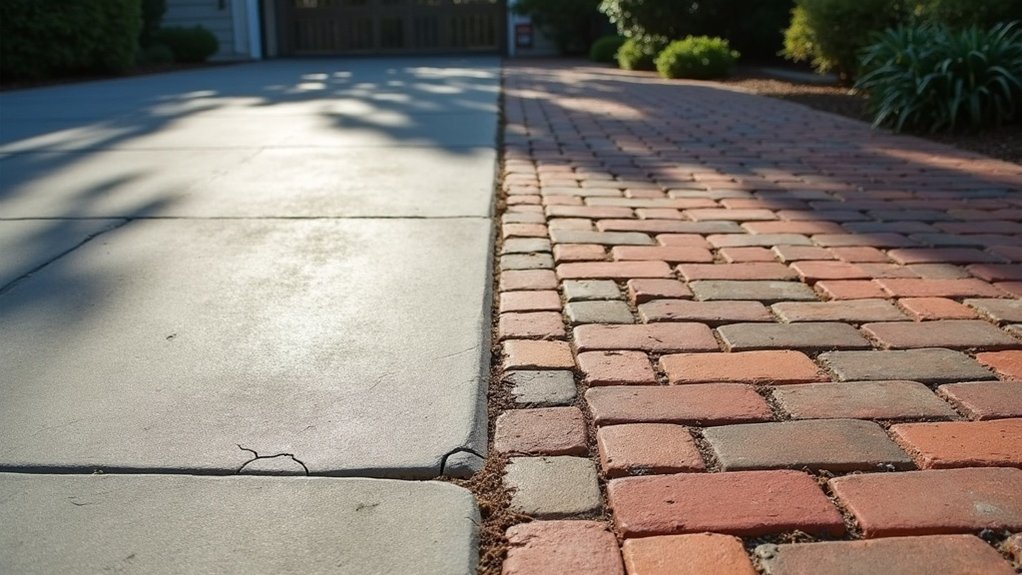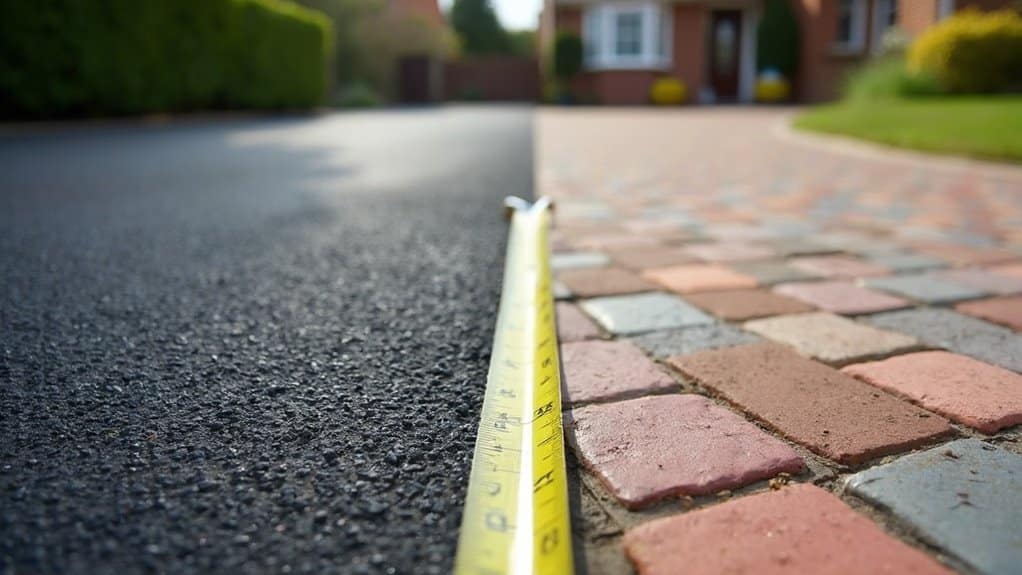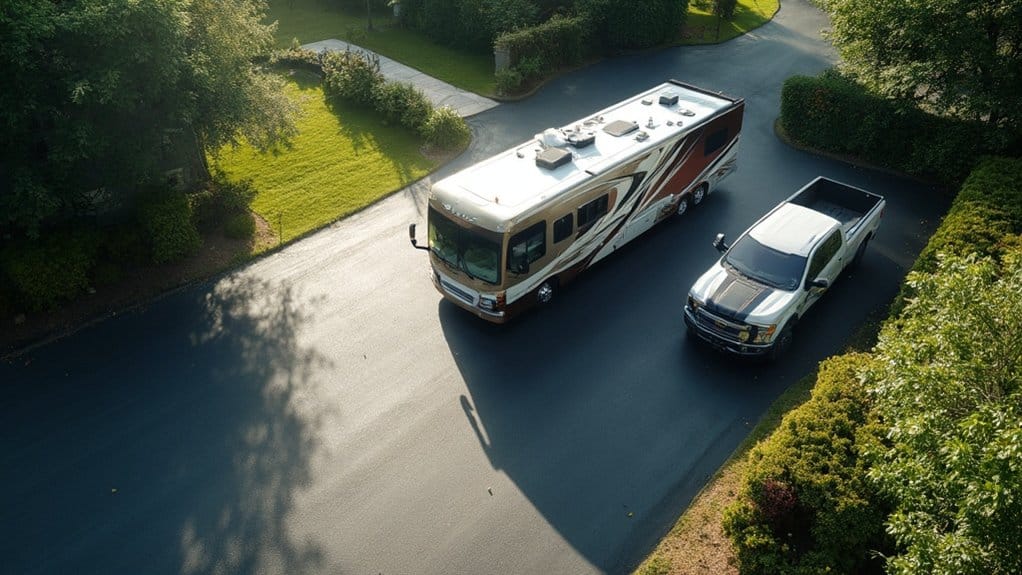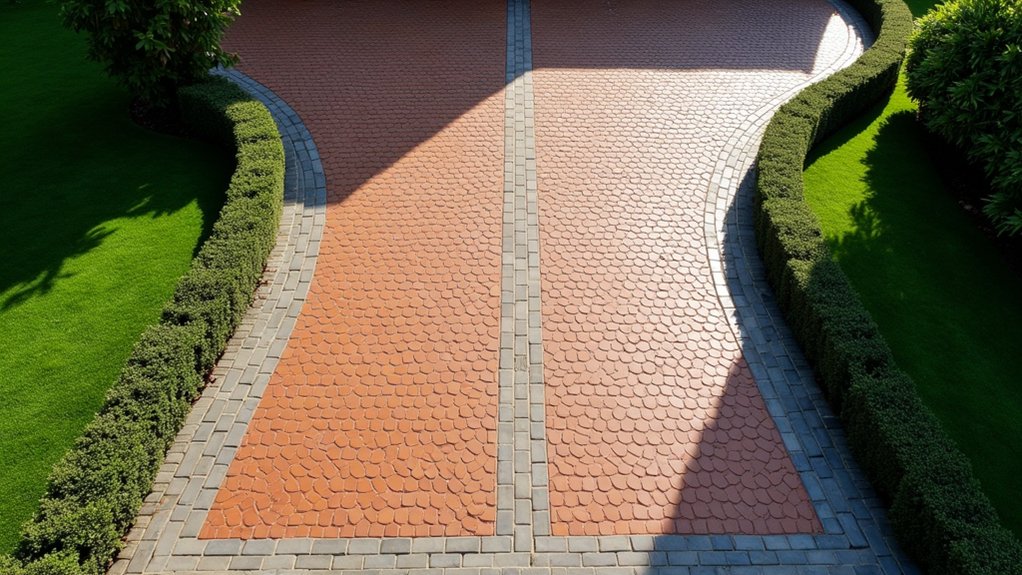When comparing concrete driveways and block paving, block paving typically lasts longer, often exceeding 40 years with the right care. In contrast, concrete driveways usually last between 25 to 30 years but are more prone to cracking under pressure. The interlocking design of block paving enhances its durability and allows for easy replacement of individual blocks if damaged. Although concrete may have a lower initial cost, the potential repair expenses over time can add up. If you’re weighing your options for a driveway, keep reading for more insights on durability and maintenance.
Table of Contents
ToggleKey Takeaways
Concrete driveways usually last between 25 to 30 years, and with the right care, they can even reach up to 40 years. On the other hand, block paving can last anywhere from 25 to 40 years, with well-maintained installations sometimes exceeding that mark.
The lifespan of both options is greatly influenced by proper installation and the quality of materials used. Block paving has an advantage due to its interlocking design, which helps reduce stress and cracking, making it generally more durable than solid concrete slabs.
Environmental factors, like freeze-thaw cycles, can affect the durability of both surfaces. However, block paving tends to withstand these conditions better, making it a more resilient choice for many homeowners.
Lifespan Comparison
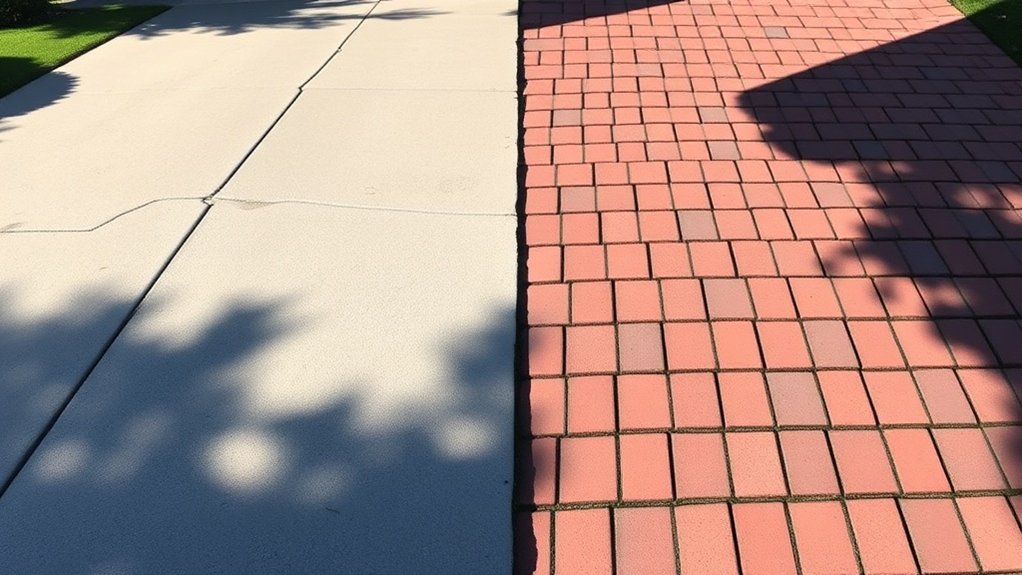
When comparing the lifespan of concrete driveways and block paving, several key factors affect durability.
Concrete driveways typically last between 25 to 30 years, with the potential to reach 40 years under ideal conditions and proper installation. Well-installed and maintained concrete driveways can significantly enhance longevity. Additionally, regular maintenance such as sealing every 2-3 years can prevent moisture damage and extend the lifespan of concrete surfaces.
Block paving offers a similar lifespan, lasting around 25 to 40 years, and well-maintained installations can exceed 40 years.
The quality of materials and the sub-base are crucial.
Environmental factors, like freeze-thaw cycles and exposure to road salts, can accelerate wear on both surfaces.
Therefore, your choices in installation methods and ongoing maintenance are vital for maximising the lifespan of either option.
Being mindful of these aspects can help you make an informed decision.
Durability Factors
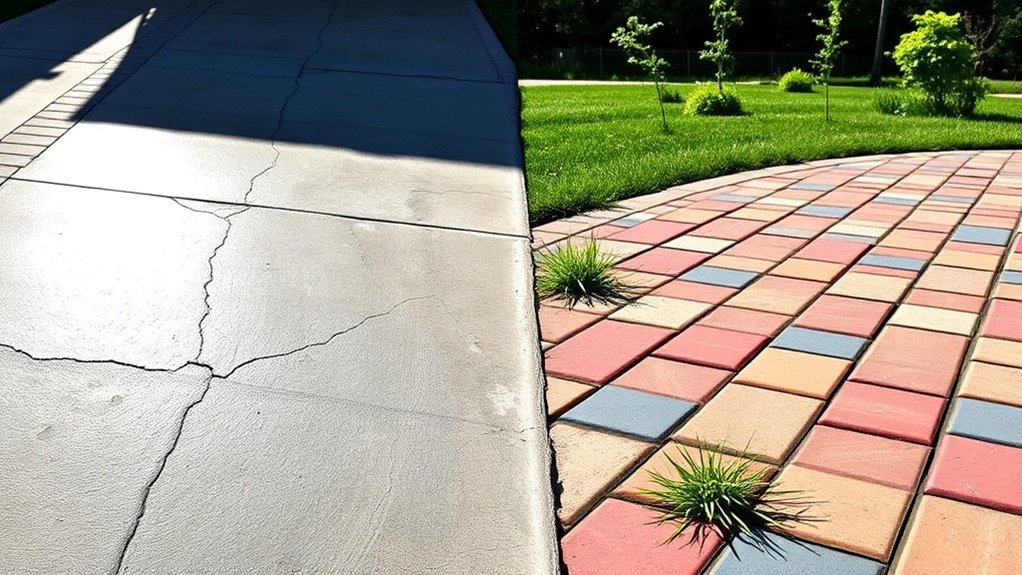
When evaluating durability factors, it’s important to compare the lifespan and cracking resistance of concrete driveways with block paving. The quality of installation, materials, and environmental conditions play a significant role in how each option withstands wear and tear. For example, a well-installed block paving driveway can last longer than a poorly laid concrete one. Understanding these factors will help you choose the driveway solution that best suits your needs. Additionally, concrete driveways are known for exceptional durability, making them a strong contender in the long-term investment category.
Lifespan Comparison
When comparing concrete driveways and block paving, both are durable options, but their lifespans can differ significantly due to key factors. Consider the material quality, installation methods, environmental conditions, and maintenance requirements when assessing their longevity. Proper maintenance practices can greatly enhance the lifespan of concrete driveways, often extending it beyond the average range.
| Factor | Concrete Driveways | Block Paving |
|---|---|---|
| Material Quality | High-quality mixes extend lifespan | Varies based on type and quality |
| Installation | Professional installation is crucial | Skilled laying is essential |
| Environmental Impact | Can suffer from freeze-thaw cycles | More resilient in diverse climates |
| Maintenance | Requires regular upkeep | Easier to repair and replace |
Cracking Resistance
When comparing concrete driveways and block paving, their resistance to cracking differs significantly due to their design and materials.
Block paving features an interlocking system that allows for some movement in the ground, reducing stress points that can lead to cracking in concrete. On the other hand, concrete is a solid slab, making it more vulnerable to cracks, especially during freeze-thaw cycles when moisture can seep in and cause damage.
Block paving also offers better drainage thanks to its permeability, which helps prevent water build-up. If a block paving driveway gets damaged, you can easily replace individual blocks without compromising the overall look or strength.
In contrast, concrete often requires extensive resurfacing or patching if it cracks. Additionally, concrete’s prone to cracking nature can lead to higher long-term maintenance costs compared to block paving, which may require fewer repairs over time.
Maintenance Requirements
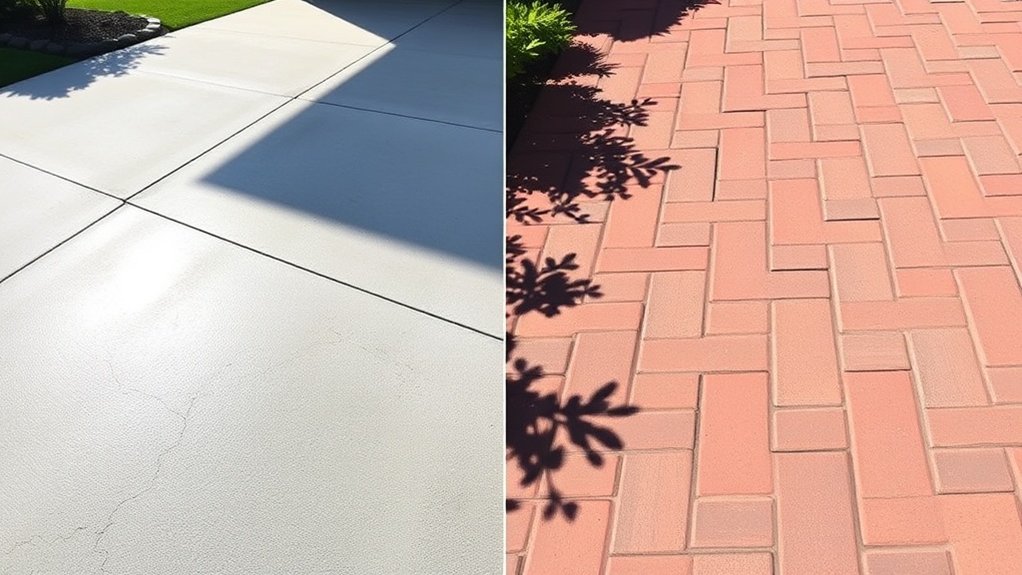
Proper maintenance is key to keeping your concrete driveways and block paving looking great and lasting longer.
For concrete, set up a monthly routine that includes power washing to remove dirt and stains. It’s important to deal with oil or grease spills immediately to avoid discolouration. Reapply sealants every two years to protect against water damage and wear.
For block paving, regular cleaning is essential to prevent weed growth and maintain its appearance. Jet washing can be effective but must be done carefully to avoid dislodging the jointing sand. Additionally, regular cleaning is important for tarmac driveways to prevent harmful substance buildup that can degrade the surface.
Regularly check and top up the sand in the joints to prevent erosion and maintain structural integrity. Additionally, good drainage management is crucial for both surfaces to reduce the risk of water damage.
Cost Analysis
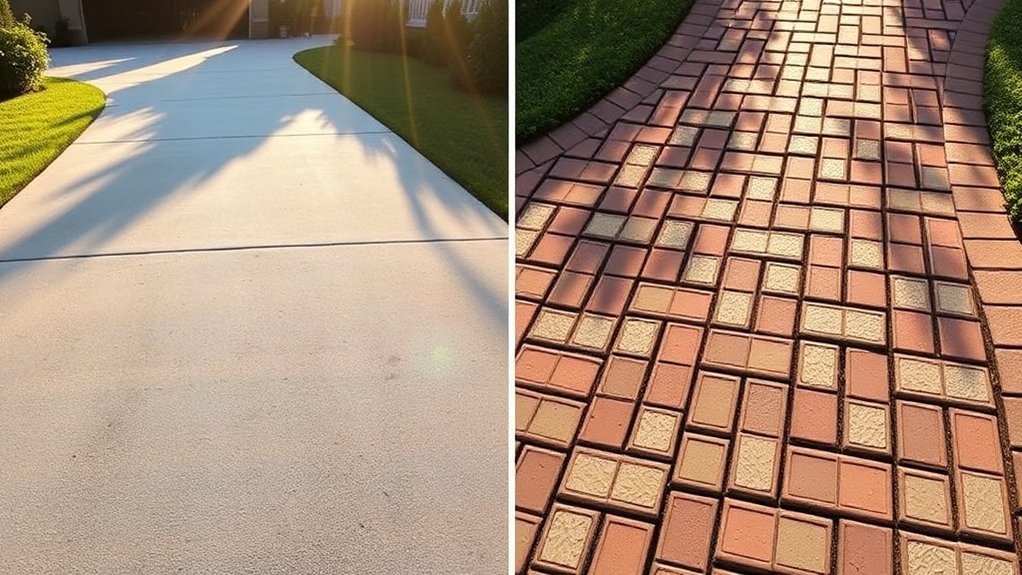
When considering a driveway installation, it’s important to understand the cost differences between concrete driveways and block paving.
Basic concrete driveways typically range from £4 to £15 per square foot, making them more budget-friendly upfront compared to block paving, which can cost between £10 and £30 per square foot depending on the materials chosen.
Installation methods also play a significant role in costs. Block paving requires skilled labour for accurate placement, often doubling labour expenses compared to concrete.
While decorative concrete can help narrow the price gap, it’s crucial to consider long-term repair costs. Concrete repairs can be expensive due to the need for extensive resurfacing, whereas paver repairs are usually more straightforward and cheaper, which could make up for the higher initial installation costs over time.
Long-Term Value
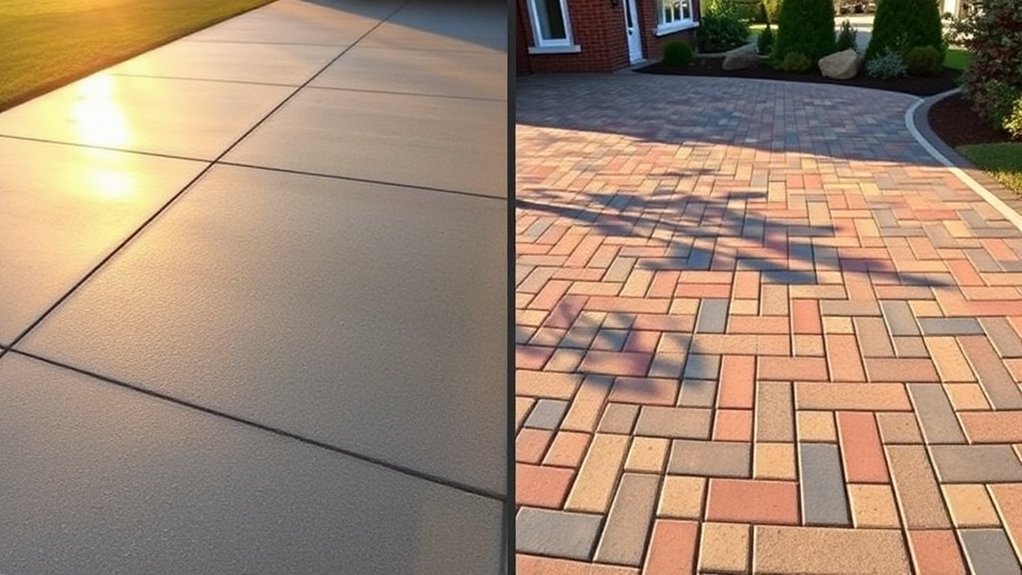
Understanding the long-term value of your driveway choice is crucial for making an informed decision. Block paving is often a strong contender due to its lifespan of 20 to 50 years and low maintenance needs. This durability not only reduces the need for frequent replacements but also boosts your property’s resale value, as buyers appreciate its aesthetic versatility and robustness.
On the other hand, concrete can also last up to 50 years, but it may incur expensive repairs within the first decade if not properly maintained. These potential costs can lower its overall value.
Therefore, investing in block paving may provide better long-term returns, making it a more appealing option for homeowners looking to enhance their property’s value over time.
Environmental Impact
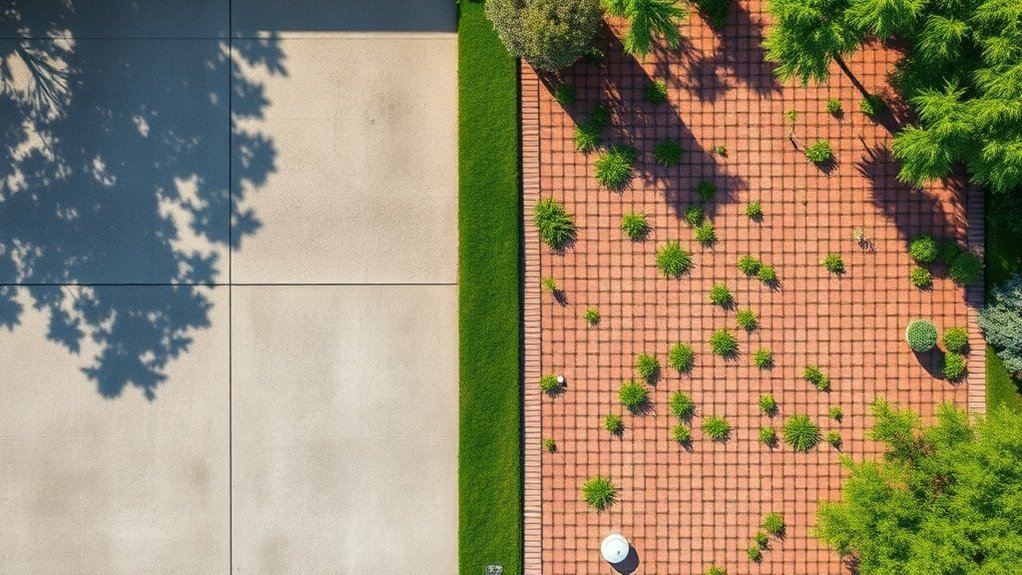
When it comes to driveways, concrete and block paving have their pros and cons, particularly regarding their environmental impact.
Concrete production generally has a lower carbon footprint, thanks to energy efficiency and the use of locally sourced or recycled materials. Innovations like low-carbon mixes further improve its sustainability.
On the other hand, asphalt, which relies on petroleum, demands more energy and significantly contributes to greenhouse gas emissions.
Traditional concrete is often impermeable and can worsen runoff problems, whereas permeable concrete and block paving are better for managing water.
These options not only ease stormwater issues but also help reduce the urban heat island effect, making them more environmentally friendly.
Choosing the right material can make a real difference to your environmental footprint.
Aesthetic Appeal
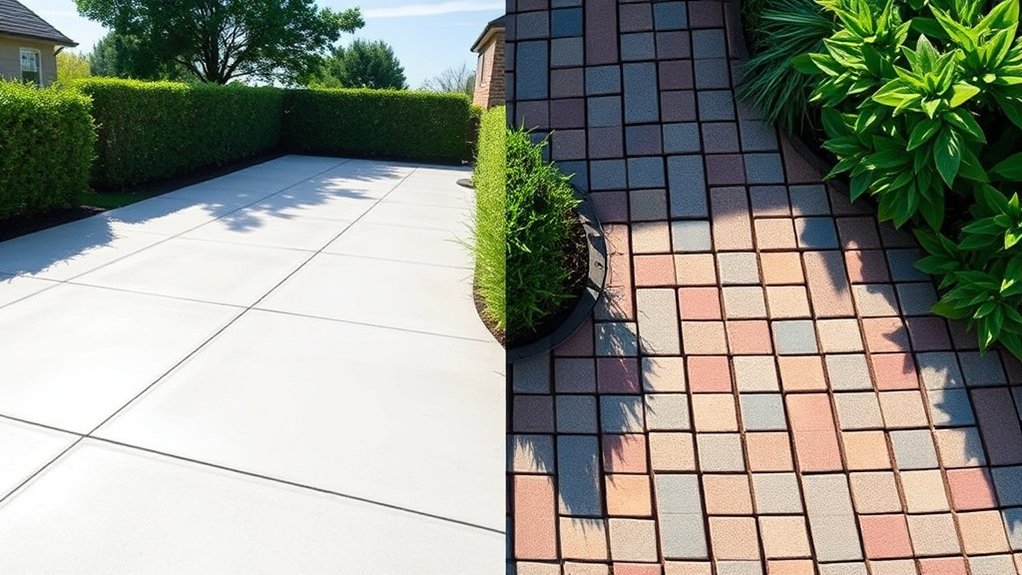
Aesthetic appeal is crucial when choosing between concrete driveways and block paving, as the visual impact of each can significantly affect your property’s overall appearance.
Block paving comes in a variety of colours, from warm reds to natural stone shades, allowing you to personalise your driveway to match your home’s style. The ability to create patterns like herringbone or basketweave adds further visual interest.
In contrast, concrete usually has a uniform grey look, with fewer colour options that can fade over time. While stamped textures can improve concrete’s appearance, they don’t offer the same design flexibility as block paving.
Ultimately, the vibrant colours and unique patterns of block paving enhance curb appeal and can increase your property’s value.
Design Flexibility
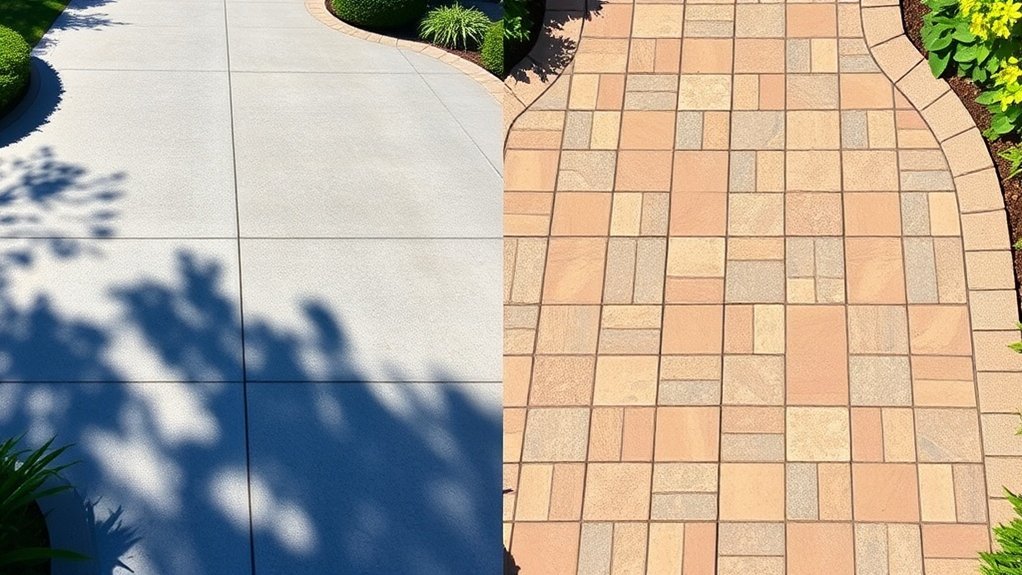
When it comes to designing driveways, both concrete and block paving have their own benefits that cater to different tastes.
Concrete offers various custom patterns and decorative options, such as stamped designs and colour treatments, which can enhance the look while providing good grip. You could choose unique textures or stick with a simple surface, adding borders for a touch of distinction.
Block paving, on the other hand, stands out due to its modular design. It allows for numerous layout patterns like herringbone and cobblestone, making it suitable for various architectural styles.
Its ability to blend with landscaping features and practical elements, like drainage channels, not only boosts functionality but also offers creative design possibilities.
Repair Processes
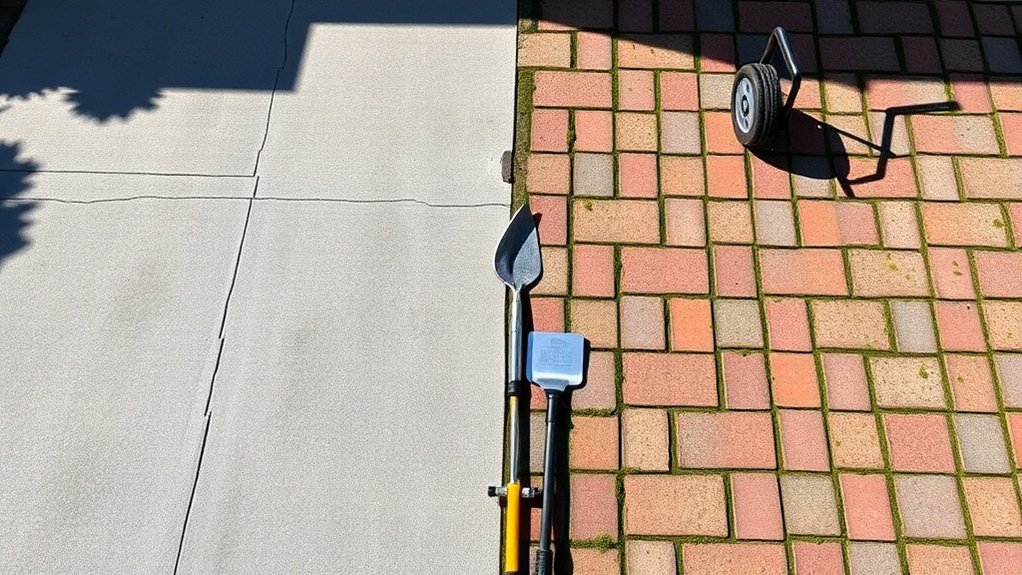
To effectively tackle driveway damage, start by evaluating the severity of the issues, as this will dictate your repair strategy.
For small cracks, use a concrete patching compound. Clean the area thoroughly and apply the compound with a putty knife.
For larger cracks, widen the edges to create a reverse “V” shape, and consider slabjacking for any sunken sections.
Always clean the repair area well and lightly dampen the surface before applying materials to improve adhesion.
Use backer rods for wide cracks and reinforce larger patches with rebar.
Proper curing and sealing after repairs are essential to extend the lifespan and integrity of your driveway.
Practicality and Functionality
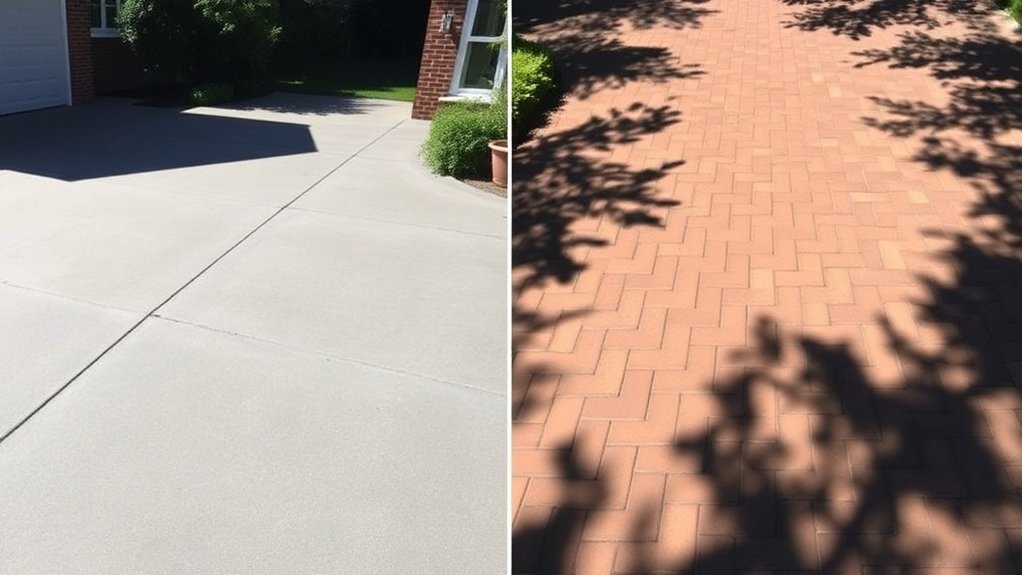
Both concrete driveways and block paving offer practical surface solutions, but their effectiveness differs significantly in terms of installation, load-bearing capacity, and maintenance.
Block paving is particularly good at distributing weight, as its interlocking bricks spread the load evenly, thereby reducing the chances of cracking under heavy use. In contrast, concrete driveways, which are typically laid as a single slab, can be prone to cracking when subjected to concentrated stress.
Moreover, block paving has the advantage of enhanced surface traction. Its textured surface and drainage through the joints help prevent slips, particularly in wet weather, making it a safer option.
While concrete driveways can be quicker to install, they require careful upkeep to maintain traction and prevent deterioration over time.
Final Considerations
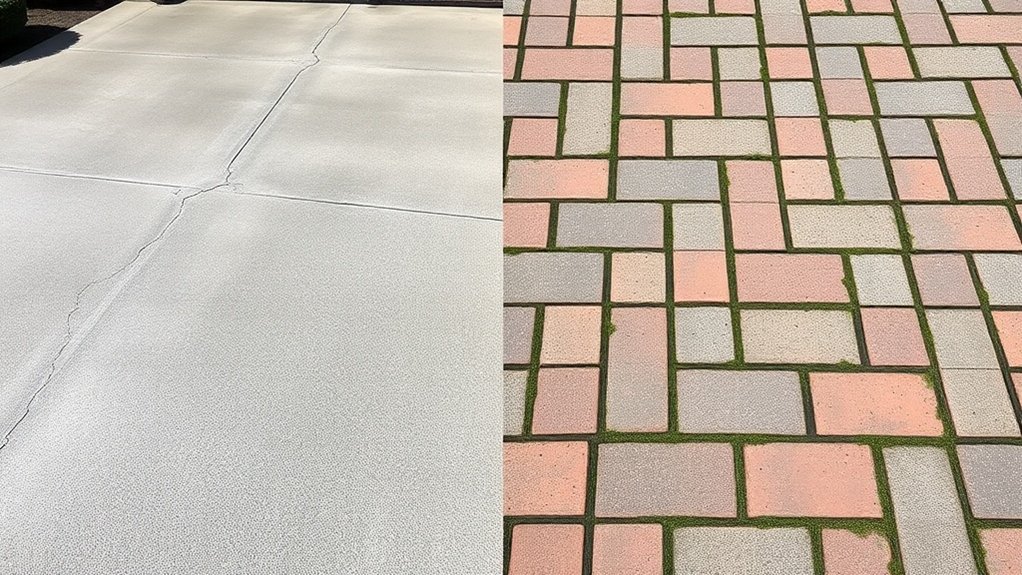
When deciding between concrete driveways and block paving, there are some key factors to consider.
Firstly, installation methods are crucial. Block paving needs a solid base for proper drainage, while concrete requires a good seal to prevent cracking.
Climate also plays a role. In colder areas, block paving is more flexible and less prone to cracking, whereas concrete can suffer significant damage.
Although concrete might seem cheaper at first, block paving can be more cost-effective in the long run because it lasts longer and is easier to repair.
Lastly, consider maintenance. Block paving is generally easier to repair and clean, which can enhance its durability compared to concrete driveways.
Frequently Asked Questions
How Do Weather Conditions Affect Driveway Lifespan?
Weather conditions significantly influence the lifespan of driveways. Fluctuations in temperature and moisture levels can speed up wear and tear, leading to cracks and surface damage. For instance, freezing temperatures can cause water to expand within cracks, worsening the issue. To counteract these effects, regular maintenance and thoughtful design are essential. By taking these steps, you can help ensure your driveway endures even in challenging weather.
Can I Install Block Paving Over an Existing Concrete Driveway?
Yes, you can lay block paving over an existing concrete driveway, but ensure the concrete is in good condition first. If there are cracks or significant damage, it’s best to repair these issues to prevent complications later on. Block paving offers great aesthetic appeal and is easier to replace individual blocks if needed. Just remember that proper drainage is essential to avoid water pooling.
What Is the Best Way to Clean a Concrete Driveway?
To clean your concrete driveway effectively, use methods such as pressure washing and scrubbing with strong degreasers. Regular maintenance, like sealing and quick stain removal, will help keep it in good condition and looking great over time.
Are There Eco-Friendly Sealants for Block Paving?
Picture a vibrant garden under a clear sky. There are eco-friendly sealant options available for your block paving, such as water-based and soy-based products. These choices help protect your paving from the elements while being kinder to the environment, promoting both durability and sustainability.
How Does Soil Type Influence Driveway Performance?
Soil type significantly affects driveway performance. Poor drainage and inadequate compaction can cause instability and cracking. For instance, clay soils tend to retain water, making them unsuitable for driveways. In contrast, well-drained and compacted soils, like sandy or loamy types, enhance durability, resulting in a longer-lasting driveway that requires less maintenance.
Conclusion
When comparing concrete driveways and block paving, durability and longevity are crucial factors. Concrete generally outlasts block paving, but the latter provides greater flexibility and aesthetic variety. Think of your driveway as a key aspect of your home’s overall appeal; make your choice carefully. Assess your specific requirements—such as maintenance, budget, and design—before deciding. Ultimately, choosing the right option now can save you both time and money later, ensuring your driveway endures over time.
Looking for an affordable driveway option? Discover the cost differences between tarmac and block paving that could impact your decision.
Find out if tarmac driveways can handle the weight of your RV or truck and discover the key factors that Read more
Get inspired by the best block paving patterns for driveways that blend style and durability; discover which layout will elevate Read more

